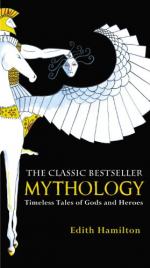|
|
Mythology Part 7, Chapter 2: The Norse Gods
The gods of Asgard were heroic, always in the process of fighting the Giants of Jotunheim. They knew that someday everything they fought for would be destroyed. Odin was the god of the Sky. He was aloof and held feasts in his hall even though he never ate. Two ravens, memory and thought, were on his shoulders at all times. He was chiefly responsible for postponing Ragnarok, the final day of destruction. He lost an eye in order to drink from the well of wisdom. He learned runes by suffering pain all night hanging in a tree. The Valkyries attend him. Wednesday is named after him.
There were five other important gods: Balder, Thor, Freyr, Heimdall, and Tyr. Balder was a beloved son of Odin and his wife Frigga. He was fated to die young. Odin went to Nilfheim, the land of the dead, and found Hela, the goddess of the dead. She told him that Balder was cursed. The other gods thought that Frigga would always protect him. They would strike him with knives and swords, but nothing would happen. Loki was the son of a giant but had somehow earned a sworn brotherhood with Odin. He hated goodness. Disguised as a woman, he found out from Frigga that Balder was susceptible only to mistletoe. Loki encouraged Hoder, Balder's blind brother, to throw mistletoe at Balder. It killed him. Frigga wanted the gods to rescue him from the realm of the dead. They built a pyre on a great ship and sent it burning into the sea. Hela said that she would return him to life only if the entire world mourned his death. A giantess did not mourn and Balder was never returned.
"Loki was punished. The gods seized him and bound him in a deep cavern. Above his head a serpent was placed so that its venom fell upon his face, causing him unutterable pain. But his wife, Sigyn, came to help him. She took her place at his side and caught the venom in a cup." Part 7, Chapter 2, pg. 458
Thor, the thunder god, was the strongest of the Aesir, the gods. Freyr cared for the fruits of the earth. Heimdall guarded Bifrost, the bridge to Asgard. Tyr was the god of war. Goddesses were less important in this world. Frigga, Odin's wife, was mysterious. She spun threads of gold. Freya was the goddess of love and beauty but she often killed in war. A goddess, Hela, ruled the underworld. Men ruled the earth, and death was a woman's business.
In the beginning, there was a chasm of nothingness bordered by Nilfheim on the north and the land of fire in the south. Ymir was the first giant. He was the grandfather of Odin. Odin and his brothers killed Ymir and made the earth and sky from him. In the middle, they created men and women from trees: men from ash, women from elm. Dwarfs existed under the earth. Elves tended flowers and streams. An ash tree supported the universe. Its roots connected to all the planets. Past, Present, and Future protected it. A serpent and its children perpetually gnawed at its roots. Someday everything would fall. Frost giants and Mountain giants were the enemies of the men and gods. There was a prophecy that in the destruction, the world would be reborn and a god higher than Odin would rule.
A collection of wise sayings also makes up the remnants of Norse religion. They are like Proverbs. There are writings concerning war, money, ale, and life. Some of these are cheerful but others speak of pain and suffering.
"Along with their truly awe-inspiring heroism, these men of the North had delightful common sense. The combination seems impossible, but the poems are here to prove it. By race we are connected with the Norse; our culture goes back to the Greeks." Part 7, Chapter 2, pg. 465



